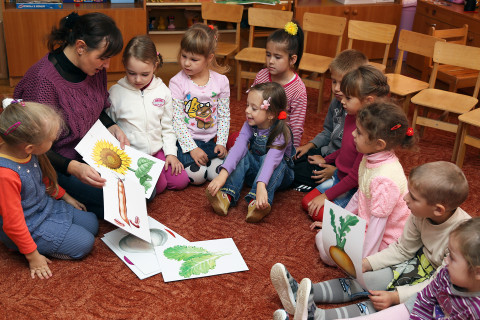The doctoral dissertation of Natalia Koricheva describes how preschool children aged from 4 to 7 learn English as a foreign language in the kindergartens. The research explains how English teachers can organize and regulate the learning process during the lessons. The dissertation aims to find out how to foster preschool learners to use English for communication.
Theoretical analysis allowed studying children’s language awareness in using their native language (Russian) and English; describing the types of learners’ interest in using English and their communicative initiative in English. The study includes the theoretical description of the foreign language learning environment, which can be organized basing on the principles of bilingualism.
The study includes several research methods to collect qualitative and quantitative data. The English teachers (N=4) participated in interviews and observations. In addition, they filled the questionnaire to explore their teaching methods. The teachers’ view of using communicative techniques was compared with their real practices at the lessons.
56 children aged from 4 to 7 were interviewed and observed during almost 3 years of the experimental work. That provided many data about how they use English and Russian during the lessons.
Based on the analysis of the collected data, there were found contradictions between how the English teachers think they teach and how they really do it. It was registered that young learners avoided using English as a foreign language. The assessment of learners from the control and experimental groups indicated that most part of them had a low level of language awareness, interest in using English and communicative initiative in it. That situation became a challenge for English teachers.
To solve the problem the foreign language teaching toolkit was integrated into the teaching process in the experimental group. The Toolkit includes five English teaching techniques based on the principles of bilingualism: using a puppet, language zoning, commenting and using gestures and intoning. The English teachers of the experimental group were specially trained to use the Toolkit.
After almost 3 years of using the Toolkit, the young learners of both experimental and control groups were interviewed and observed again. The results proved the effectiveness of the Toolkit for fostering children’s communication in English. Using special teaching techniques in a structured foreign language learning environment regulates learners; choice of the languages; motivates them to speak English and promotes their communication with teachers and peers in English. The study offers a framework for future researches to explore how young children learn foreign languages at preschool age.
The doctoral dissertation of MA Natalia Koricheva, entitled Foreign language teaching toolkit to foster young learners to communicate in English: Russian preschool context, will be examined at the Philosophical Faculty. The opponent in the public examination will be Associate Professor Irina Vronskaia (Herzen State Pedagogical University of Russia) and the custos will be Professor Ritva Kantelinen (University of Eastern Finland).
